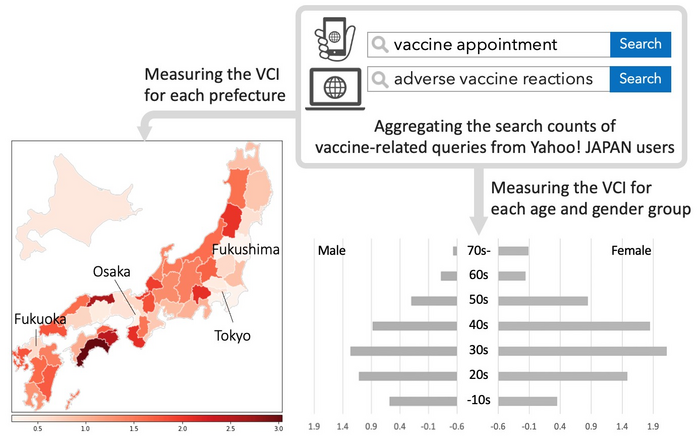Since becoming available, vaccines against COVID-19 have been vital in preventing deaths. However, vaccination rates in many developed countries are below expectations of public health officials, which is partly due to vaccine hesitancy. Scientists from Japan have found that searches related to vaccine side effects actually increased with adoption rates of vaccination. This work may help public health officials better understand vaccine hesitancy.
Vaccines against COVID-19 were remarkable in their rapid progress through development, manufacture, and introduction to the market. However, the rate of their uptake among health consumers did not match this speed. In Japan, a large survey found that many people expressed concerns about adverse reactions and vaccine effectiveness. Even before the pandemic, Japan had scored low on measures of trust in vaccines. Thus, being able to understand and measure people’s concerns could help shape public relations outreach efforts with the goal of increasing vaccine adoption.
A team of researchers at Nara Institute of Science and Technology (NAIST) examined online searches on Yahoo! JAPAN to quantify the degree of unease about getting the COVID-19 vaccine. They worked with Yahoo! JAPAN to develop a ‘vaccine concern index’ (VCI) based on the aggregated search counts of vaccine-related queries by prefecture for August and September 2021. The VCI captured searches of terms that may indicate vaccine hesitancy (such as adverse reactions and side effects) out of all vaccine-related searches (including searches for vaccination centers or appointments). The team found that the concern index tended to be lower in more populated areas, but higher in people in their 20s to 40s, especially female users.
“This could be related to the online spread of misinformation that the vaccine causes infertility,” says author Shoko Wakamiya, “and lower concerns among older people may be because they have limited familiarity with online searching.”
The team found that the VCI was larger in prefectures with higher vaccination rates. This suggests that web searches for vaccine adverse reactions may be one step taken by health consumers before ultimately choosing to get vaccinated, which highlights the importance of providing complete and accurate information online. Conversely, individuals strongly hesitant towards vaccination may not be looking for online information, or are looking online less often.
“As part of a collectivistic, Confucian culture, Japanese people often have an interdependent view of self,” explains senior author Eiji Aramaki. “As a result, ‘greater good’ messaging and guidelines may be more effective in Japan.”
This work may pave the way for equally cost-effective examinations of societal attitudes toward COVID-19 vaccination in similar cultures, and ultimately improving online resources about these vaccines.
